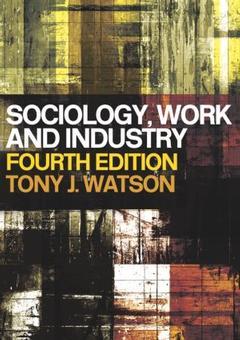Sociology, work and industry (4th ed)
Langue : Anglais
Auteur : WATSON Tony

Explains how the discipline of sociology contributes to our understanding of the variety of work practices and institutions in modern society. The volume includes a new chapter on the distinctiveness of the sociological perspective along with guidance on the research and analysis of work.
1. Studying Work and Society 1.1 People, Work and Society 1.2 Thinking About Work Sociologically 1.2.1 Choices, Constraints and Opportunities in Work and Society 1.2.2 Work and the Sociological Imagination 1.3 Sociology, Critique and Democratic Debate About Work 1.3.1 Sociology and the Emergence of Industrial Societies 1.3.2 The Continuing Challenge 1.3.3 Sociology and the Informing of Democratic Choices About Work 1.4 Researching and Theorising Work Patterns and Experiences 1.4.1 Sociology as Science 1.4.2 Theory, Work and Society 1.4.3 A Range of Research Methods 1.4.4 Methodological Assumptions 1.5 Coping with the Variety of Orientation in the Sociology of Work and Industry 2. The Sociological Analysis of Work and Industry 2.1 Six Strands of Thought in the Sociology of Work 2.2 The Managerial-Psychologistic Strand 2.2.1 Scientific Management 2.2.2 Psychological Humanism 2.2.3 Discussion 2.3 The Durkheim-Systems Strand 2.3.1 Human Relations 2.3.2 Systems Thinking in Industrial Sociology 2.3.3 Corporate Cultures 2.3.4 Discussion 2.4 The Interactionist Strand 2.4.1 The Chicago School and Symbolic Interactionism 2.4.2 Organisations as Negotiated Orders 2.4.3 Ethnomethodology 2.4.4 Discussion 2.5 The Weber-Social Action Strand 2.5.1 Max Weber 2.5.2 Orientations to Work 2.5.3 Discussion 2.5.4 Marx and Engels 2.5.5 Marxian Industrial Sociology and Labour Process Analysis 2.5.6 Discussion 2.6 The Discursive Strand 2.6.1 The Postmodernist Perspective and Poststructuralism 2.6.2 Foucault and Human Subjectivity 2.6.3 Discussion 3. Work, Society and Change 3.1 The Nature of Modern Societies 3.2 The Emergence of Industrial Capitalism 3.2.1 From Feudalism to Capitalism 3.2.2 Protestantism and the Spirit of Capitalism 3.2.3 Social Groups and the Rise of Industrialism 3.3 Industrialisation and the Changing Division of Labour 3.4 Technology, Science and Social Change 3.5 Industrial Capitalism: Change or transition? 3.5.1 Post-Industrialism and the Information Society 3.5.2 Post-Fordism 3.5.3 Flexible Specialisation 3.5.4 Postmodernity 3.5.5 Globalisation, Convergence and Internationalisation 3.5.6 The Changing Significance of Service Work 4. Work Organisations 4.1 The Organisational Principle of Work Structuring 4.2 The Nature of Work Organisations 4.3 Official and Unofficial Aspects of Organisations 4.4 Organisational Structures and Cultures 4.5 Official Structure and Culture: Basic organisational design principles 4.5.1 Bureaucracy 4.5.2 Classical Administrative Principles 4.5.3 Taylorism and Fordism 4.6 The Limits of Bureaucracy and the Paradox of Consequences 4.7 Contingency and Choice in the Shaping of Organisational Structures and Cultures 4.8 Micropolitics, Careers and Unofficial Management Practices 4.8.1 Vertical Aspects 4.8.2 Horizontal Aspects 4.8.3 Unofficial Practices and Bureaucratic Dysfunctions 4.8.4 Ambiguity and Decision Processes 5. The Changing Organisation and Management of Work 5.1 Work Restructuring and the Logic of Corporate Management 5.1.1 The Logic of Corporate Management 5.2 Choice and Circumstance in the Shaping of Employment Practices 5.2.1 Variations in Employment Relations Style 5.2.2 Labour Processes and Employment Practice Options 5.2.3 'HRM 'and the Choice Between 'High Commitment' and 'Low Commitment' Human Resourcing Strategies 5.3 The Pursuit of Flexibility and Direct and Indirect Managerial Control Options 5.3.1 Combining Two Types of Flexibility: The flexible firm 5.3.2 Flexibility and New Work Management Practices 5.4 Changing Patterns of Job Design and Job Redesign 5.5 Information and Communication Technologies (ICTs), Work Design and Organisational Shaping 5.6 Culture Management, Worker Subj
lI>The Critical Heritagel/I> gathers together a large body of critical sources on major figures in literature. Each volume presents contemporary responses to a writer's work, enabling student and researcher to read the material themselves.
Date de parution : 09-2003
Ouvrage de 480 p.
24.6x17.4 cm
© 2024 LAVOISIER S.A.S.



